This Pantheistic Meta-Hallucination:
How Fiction Supersedes Simulacra
Tuesday, June 27, 2006 → by Danieru
Ever wished yourself Godlike properties? Ever wondered what it felt like to spawn universes from the slightest ounce of your being? Well now you can, with The Random Logline Generator! Realising mythical universes is as easy as depressing your index finger. Don't believe me? Here are some meta-universes I prepared earlier: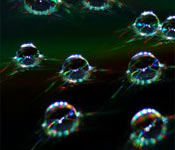
Pantheistic Solipsistic Simulacra
According to Robert Heinlein's theory of Panthesitic Solipsism (or the World as Myth hypothesis):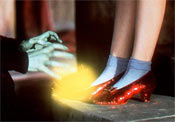 This idea can of course be taken further, as all large things generally are on The Huge Entity. Consider for a moment the concept of the simulacrum, that is, an entity which has ceased representing the object it was first designed to and has since taken on a hyper real identity of its own. A multi-layered example of this would be an art student's photo-realistic landscape painting, modeled on a series of abstractions he drew which themselves were based on a single photograph taken at a particularly serene moment as the clouds parted over the perceived horizon. The photo-real painting is a hyper real clone of a series of copies which themselves only bore relation to a photo which originated from an idealised perspective. The reality we perceive, once filtered by the simulacra of modern, mass produced society, is as far removed from true 'non-fiction' as a science fiction epic. Both your world view and that of the sci-fi author suffer from a poverty of absolute realism, because in truth there can never be such a thing. All belief in absolute reality is akin to naive idolatry.
This idea can of course be taken further, as all large things generally are on The Huge Entity. Consider for a moment the concept of the simulacrum, that is, an entity which has ceased representing the object it was first designed to and has since taken on a hyper real identity of its own. A multi-layered example of this would be an art student's photo-realistic landscape painting, modeled on a series of abstractions he drew which themselves were based on a single photograph taken at a particularly serene moment as the clouds parted over the perceived horizon. The photo-real painting is a hyper real clone of a series of copies which themselves only bore relation to a photo which originated from an idealised perspective. The reality we perceive, once filtered by the simulacra of modern, mass produced society, is as far removed from true 'non-fiction' as a science fiction epic. Both your world view and that of the sci-fi author suffer from a poverty of absolute realism, because in truth there can never be such a thing. All belief in absolute reality is akin to naive idolatry.
The characters of myth, of fiction, can often supersede the characters in real life in terms of the realism conveyed therein. What's more, in the pages of a book or reels of the cinema, universes are brought into being with ready made perspectives from which to view them. In the objective, human reality inhabited by all, conflicts in perceptions cause an infinity of simulations to blur into a shared illusion, which itself bears no relation to the world believed to exist by the perceiver:
Understanding this simulacrum of reality can have fascinating consequences, not least in the realm of Metafiction: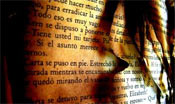 Now, if by mere random logline generation one can spawn new mythological universes into being, and if these universes, by analogy to the simulacrum, bear as much relation to objective truth as the perceptions you call 'reality', could it be possible to formalise your perceptions, by self reference, into a true fiction which you were capable of accepting? That is, just as metafiction references itself in order to question the very nature of fiction, so by reading blog posts such as this perhaps the halo of reality which surrounds you is made to quiver to the point of collapse? Testing out this hypothesis is not easy; once again, the subjective rules all.
Now, if by mere random logline generation one can spawn new mythological universes into being, and if these universes, by analogy to the simulacrum, bear as much relation to objective truth as the perceptions you call 'reality', could it be possible to formalise your perceptions, by self reference, into a true fiction which you were capable of accepting? That is, just as metafiction references itself in order to question the very nature of fiction, so by reading blog posts such as this perhaps the halo of reality which surrounds you is made to quiver to the point of collapse? Testing out this hypothesis is not easy; once again, the subjective rules all.
Hallucination
I must admit to my rudeness right about now. Trying to convince a selection of your blog's readers that the world they inhabit is entirely fictional is not the best way to extend that readership. Not convinced that you could be living in a fiction? A word in your ear from the world of scientific folk who know about brains and stuff:
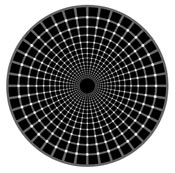
In examining alternate forms of conscious experience the 'meta' of metafiction can be conjoined with any universe you care to excuse me in destroying. Trapped in simulacra, confused by a pantheism of solipsistic world myths, the meta is meta-you, meta-me, meta-humanity, meta-world. An infinite meta-holism which caused you into existence and destroys you as, and when, it so pleases.
Meta-what?
The Fourth Wall
Finally, what will it take to knock down The Fourth Wall blanketing our fictional perceptions? The appeal of a singularly maintained perspective is obvious throughout the human world. True, in the conflict of ideas, in the meeting of distinct minds, entire civilisations have been forged from the cultural commodities given birth within them. But lest we forget the power of fiction to appease our multitudinous perceptions. History is nothing but conformity; the present a convulsive interplay of perceptions, emotions and the symbols which culture determines they convey. It is in the pages of the book where we find our futures, because in fiction we draw the very edges of not just our world, but the myriad of possible worlds our instincts have diverged us away from, and converged us yet closer towards. If all is fiction then let fiction be all. The human entity has had no greater impact on this universe than the worlds which its mind has spawned into existence. If the entire human race were wiped out tomorrow it would be through our art, our imaginary worlds that future-alien-archeologists would duly uncover us. These forms of expression are not a result of us, they are us and we are them.
It is in the pages of the book where we find our futures, because in fiction we draw the very edges of not just our world, but the myriad of possible worlds our instincts have diverged us away from, and converged us yet closer towards. If all is fiction then let fiction be all. The human entity has had no greater impact on this universe than the worlds which its mind has spawned into existence. If the entire human race were wiped out tomorrow it would be through our art, our imaginary worlds that future-alien-archeologists would duly uncover us. These forms of expression are not a result of us, they are us and we are them.
Lest this blog post roll off into an infinity of possible meta-universes, I implore you to click some of the category links below, explore the Popular-Posts archive, join in The Forum and bury yourself in all Huge Entity attempts to dissolve this world to dust. My arrogance in this suggestion is surely only equaled by my passionate plea for true sanity which I will now make once and for all:

- A telekinetic dog finds a magic lamp in a whorehouse!
- The blundering ex-husband of a wizard and the cousin of an arrogant wrestler raise five kids!
- A ghost discovers the body of a housekeeper!
- A sword-fighting eskimo finds the wallet of the brother of a helicopter pilot in a hospital!
- an infinity of fictions awaits you...
Pantheistic Solipsistic Simulacra
According to Robert Heinlein's theory of Panthesitic Solipsism (or the World as Myth hypothesis):
The World as Myth idea involves the portrayal of all myths and fictional universes existing as parallel universes to our own and that persons and beings from these various 'worlds' interact with one another.
For instance, in his last novels, Heinlein's characters actually travel to and interact with the Land of Oz. Even our own world is considered an alternate (coded as "One Small Step" for the first words spoken on the moon by Neil Armstrong).
 This idea can of course be taken further, as all large things generally are on The Huge Entity. Consider for a moment the concept of the simulacrum, that is, an entity which has ceased representing the object it was first designed to and has since taken on a hyper real identity of its own. A multi-layered example of this would be an art student's photo-realistic landscape painting, modeled on a series of abstractions he drew which themselves were based on a single photograph taken at a particularly serene moment as the clouds parted over the perceived horizon. The photo-real painting is a hyper real clone of a series of copies which themselves only bore relation to a photo which originated from an idealised perspective. The reality we perceive, once filtered by the simulacra of modern, mass produced society, is as far removed from true 'non-fiction' as a science fiction epic. Both your world view and that of the sci-fi author suffer from a poverty of absolute realism, because in truth there can never be such a thing. All belief in absolute reality is akin to naive idolatry.
This idea can of course be taken further, as all large things generally are on The Huge Entity. Consider for a moment the concept of the simulacrum, that is, an entity which has ceased representing the object it was first designed to and has since taken on a hyper real identity of its own. A multi-layered example of this would be an art student's photo-realistic landscape painting, modeled on a series of abstractions he drew which themselves were based on a single photograph taken at a particularly serene moment as the clouds parted over the perceived horizon. The photo-real painting is a hyper real clone of a series of copies which themselves only bore relation to a photo which originated from an idealised perspective. The reality we perceive, once filtered by the simulacra of modern, mass produced society, is as far removed from true 'non-fiction' as a science fiction epic. Both your world view and that of the sci-fi author suffer from a poverty of absolute realism, because in truth there can never be such a thing. All belief in absolute reality is akin to naive idolatry.The characters of myth, of fiction, can often supersede the characters in real life in terms of the realism conveyed therein. What's more, in the pages of a book or reels of the cinema, universes are brought into being with ready made perspectives from which to view them. In the objective, human reality inhabited by all, conflicts in perceptions cause an infinity of simulations to blur into a shared illusion, which itself bears no relation to the world believed to exist by the perceiver:
Reality was able to surpass fiction, the surest sign that the imaginary has possibly been outpaced. But the real could never surpass the model, for the real is only a pretext of the model. - Jean BaudrillardMetafiction
Understanding this simulacrum of reality can have fascinating consequences, not least in the realm of Metafiction:
Metafiction is ... the term given to fictional writing which self-consciously and systematically draws attention to its status as an artifact in order to pose questions about the relationship between fiction and reality. It usually involves irony and is self-reflective. It can be compared to presentational theatre in a sense; presentational theatre does not let the audience forget they are viewing a play, and metafiction does not let the readers forget they are reading a work of fiction.
 Now, if by mere random logline generation one can spawn new mythological universes into being, and if these universes, by analogy to the simulacrum, bear as much relation to objective truth as the perceptions you call 'reality', could it be possible to formalise your perceptions, by self reference, into a true fiction which you were capable of accepting? That is, just as metafiction references itself in order to question the very nature of fiction, so by reading blog posts such as this perhaps the halo of reality which surrounds you is made to quiver to the point of collapse? Testing out this hypothesis is not easy; once again, the subjective rules all.
Now, if by mere random logline generation one can spawn new mythological universes into being, and if these universes, by analogy to the simulacrum, bear as much relation to objective truth as the perceptions you call 'reality', could it be possible to formalise your perceptions, by self reference, into a true fiction which you were capable of accepting? That is, just as metafiction references itself in order to question the very nature of fiction, so by reading blog posts such as this perhaps the halo of reality which surrounds you is made to quiver to the point of collapse? Testing out this hypothesis is not easy; once again, the subjective rules all.Hallucination
I must admit to my rudeness right about now. Trying to convince a selection of your blog's readers that the world they inhabit is entirely fictional is not the best way to extend that readership. Not convinced that you could be living in a fiction? A word in your ear from the world of scientific folk who know about brains and stuff:
The neurological basis for poor witness statements and hallucinations has been found by scientists at UCL. In over a fifth of cases, people wrongly remembered whether they actually witnessed an event or just imagined it, according to a paper published in NeuroImage this week...
..."Most of us, though, have a critical reality monitoring function so that we are able to distinguish well enough between what is real and what is imagined and our imagination does not have too great an impact on our lives - unless the reality check system breaks down such as after stroke or in cases of schizophrenia."

The study found that the areas that were activated while remembering whether an event really happened or was imagined in healthy subjects are the very same areas that are dysfunctional in people who experience hallucinations.Perhaps the schizophrenic absolves themself from the shared illusion of 'normality' by having their perceptions focused on those aspects of the universe we would call 'fiction'. In this extension of my hypothesis, it is not that the schizophrenic is somehow living in an illusionary world, rather, their brain is capable of convincing them that the majority of reality which surrounds them is mere fiction. The schizophrenic, and perhaps 'sufferers' of other such neurological conditions, are able to raise themselves above the illusion we find ourselves so happy to accept, perhaps knowing all along that it is us who exhibit the traits of insanity we commonly subtract from our selfhood. Not being able to distinguish the real, hyper-real and meta-real is perhaps the most distinctly human of traits we possess.
Dr Burgess said: "We believe that hallucinations are caused by a difficulty in discriminating information present in the outside world from information that is imagined. In schizophrenia the difficulty you have in separating reality from imagined events becomes exaggerated so some people have hallucinations and hear voices that simply aren't there." These results indicate a link between the brain areas implicated in schizophrenia and the regions that support the ability to discriminate between perceived and imagined information. - link
In examining alternate forms of conscious experience the 'meta' of metafiction can be conjoined with any universe you care to excuse me in destroying. Trapped in simulacra, confused by a pantheism of solipsistic world myths, the meta is meta-you, meta-me, meta-humanity, meta-world. An infinite meta-holism which caused you into existence and destroys you as, and when, it so pleases.
Meta-what?
The Fourth Wall
Finally, what will it take to knock down The Fourth Wall blanketing our fictional perceptions? The appeal of a singularly maintained perspective is obvious throughout the human world. True, in the conflict of ideas, in the meeting of distinct minds, entire civilisations have been forged from the cultural commodities given birth within them. But lest we forget the power of fiction to appease our multitudinous perceptions. History is nothing but conformity; the present a convulsive interplay of perceptions, emotions and the symbols which culture determines they convey.
 It is in the pages of the book where we find our futures, because in fiction we draw the very edges of not just our world, but the myriad of possible worlds our instincts have diverged us away from, and converged us yet closer towards. If all is fiction then let fiction be all. The human entity has had no greater impact on this universe than the worlds which its mind has spawned into existence. If the entire human race were wiped out tomorrow it would be through our art, our imaginary worlds that future-alien-archeologists would duly uncover us. These forms of expression are not a result of us, they are us and we are them.
It is in the pages of the book where we find our futures, because in fiction we draw the very edges of not just our world, but the myriad of possible worlds our instincts have diverged us away from, and converged us yet closer towards. If all is fiction then let fiction be all. The human entity has had no greater impact on this universe than the worlds which its mind has spawned into existence. If the entire human race were wiped out tomorrow it would be through our art, our imaginary worlds that future-alien-archeologists would duly uncover us. These forms of expression are not a result of us, they are us and we are them.Lest this blog post roll off into an infinity of possible meta-universes, I implore you to click some of the category links below, explore the Popular-Posts archive, join in The Forum and bury yourself in all Huge Entity attempts to dissolve this world to dust. My arrogance in this suggestion is surely only equaled by my passionate plea for true sanity which I will now make once and for all:
The Fourth Wall is within your grasp; The Fourth Wall is everywhere and everything; The Fourth Wall is the only true reality; you are The Fourth Wall...
Categories: Science, Weird, Humour, Sci-Fi, Links, Reality, Human, Consciousness, Fiction, Quotes, Ideas, Philosophy, Simulacrum, History, Universe, Perception, Time, Art, Books, Literature, Culture
|
|

 Links
Links Subscribe via RSS!
Subscribe via RSS!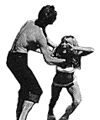


 Via Email
Via Email


June 27, 2006 12:54 PM
I think most creatives have something of this skill of the psychotic, bipolar or schizophrenic, the ability to see reality and interpret it differently, because they really do see things for what they are, but as in a dream state, you can place entirely new interpretations on what you see and make them seem completely reasonable, even take dream-like hallucinations and interpret them as actually happening.
As my shrink said, "I can't imagine what you went through", obviously thinknig how horrible it must have been, and I said, "No, you can't", with a smile on my face, remember how wonderfully creative and exotic and fresh that brief period had felt for me. There is indeed a very freeing quality to it.
But people get upset when you laugh too loudly at things that don't seem funny to them, when you tell them things about themseleves they don't want to hear, and when you make shit up just to get a rise out of them. So, you come back, if you want to live in the "real world".
Break that fourth wall at your peril, and know what you risk in doing so.
June 27, 2006 5:12 PM
I do recommend that you visit the writers blog, its mind boggling.
http://banarasthemovie.blogspot.com
Carol
June 27, 2006 6:13 PM
I definitely need to look into Jung. I know little of him, but his theory of archetypes is facinating. For anyone who is interested I have written about the inner narrative of life before in a couple of posts:
- This Protagonistically Determined Objective Reality Narrative
- The Birth of the Ultimate Narrative
- The Protagonist
I definitely feel that a large part of the composition of reality is language based, or more specifically, resides in our semiotically governed self-preserving perspectives.
As for the Fourth Wall. I wouldn't quite say I've ever knocked it down, but I have definitely veered on the brink of falling over it a few times. If I could somehow push to the point where my mind completely forgot what 'objective' reality was supposed to be, then, and only then, might I make it all the way over the top.
The Huge Entity stampedes ever onwards.
June 29, 2006 4:45 AM
December 31, 2006 3:00 AM
Lately the books I've been reading have had to do with how people shape their realities, and how to become aware of how you shape your own reality. An excellent read is Robert A. Wilson's Prometheus Rising. And I'm just finishing reading Creative Intelligence and Self Liberation by Ted Falconar, this book is about breaking out of the verbal mindset which does tend to shape most people's reality and moving into non-Aristotelian thinking or Nous, and seeing the world as it really is.
As I've read the book the concepts appealed to me very much, but I still felt like I didn't get it, but then this weekend I did mushrooms and it made sense to me, and since then really I have felt like I've been seeing the world with new eyes of sorts.
January 17, 2007 8:07 PM
Post a Comment